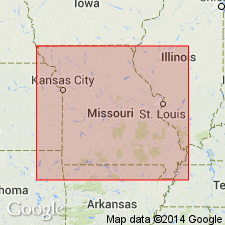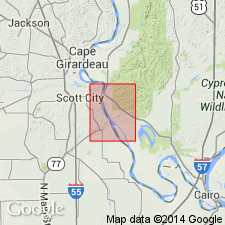
- Usage in publication:
-
- Cape Girardeau limestone
- Modifications:
-
- Named
- Dominant lithology:
-
- Limestone
- AAPG geologic province:
-
- Ozark uplift
Summary:
Named as lowermost formation of Upper Silurian. Named for Cape Girardeau, Cape Girardeau Co., eastern MO. As described by B.F. Shumard (same volume), is a fossiliferous compact bluish-gray brittle limestone. Smooth fracture in layers 2 to 6 in. thick with thin argillaceous partings. Thickness is 40 to 50 ft. Underlain by Hudson River group.
Source: GNU records (USGS DDS-6; Reston GNULEX).

- Usage in publication:
-
- Girardeau Limestone*
- Modifications:
-
- Revised
- Overview
- AAPG geologic province:
-
- Illinois basin
Summary:
Girardeau Limestone assigned to top of Maquoketa Group following usage of Thompson (1991). Mapped undivided with Leemon Formation at the surface in IL. In subsurface, mapped undivided with remaining Maquoketa Group (Cape La Croix Shale, Thebes Sandstone, and Orchard Creek Shale). Consists of brownish-gray sublithographic to lithographic limestone. Occurs in regularly spaced wavy beds 2 to 4 in. thick separated by calcareous shale partings. Interfingers with underlying Orchard Creek. Age is Late Ordovician (Cincinnatian).
Source: GNU records (USGS DDS-6; Reston GNULEX).
For more information, please contact Nancy Stamm, Geologic Names Committee Secretary.
Asterisk (*) indicates published by U.S. Geological Survey authors.
"No current usage" (†) implies that a name has been abandoned or has fallen into disuse. Former usage and, if known, replacement name given in parentheses ( ).
Slash (/) indicates name conflicts with nomenclatural guidelines (CSN, 1933; ACSN, 1961, 1970; NACSN, 1983, 2005, 2021). May be explained within brackets ([ ]).

